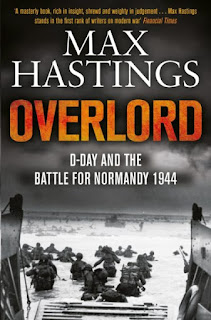Book Review: 'Overlord: D-Day and the Battle for Normandy'

© 2014 HarperCollins (Reissue cover) In 1984, Simon & Schuster published the first edition of Max Hastings' Overlord: D-Day and the Battle for Normandy, a book that re-examined the Allied invasion of northern France on June 6, 1944 and the bitter campaign that lasted two-and-a-half months and culminated with the liberation of Paris on August 25, 1944. Based on extensive research, hundreds of interviews with veterans and other eyewitnesses, and benefitting from new insights gleaned from the declassification of the "Ultra secret - the long-concealed fact that the Allies had broken the Germans' "unbreakable" Enigma cypher codes - Hastings' book sought to look beyond the legends and myths that had surrounded Operation Overlord and explain how the Allies defeated the German Wehrmacht in Normandy despite a "quality gap" in weapons (except artillery and aircraft), training, tactics, and overall soldiering skills that favored the Germans. At the ...





